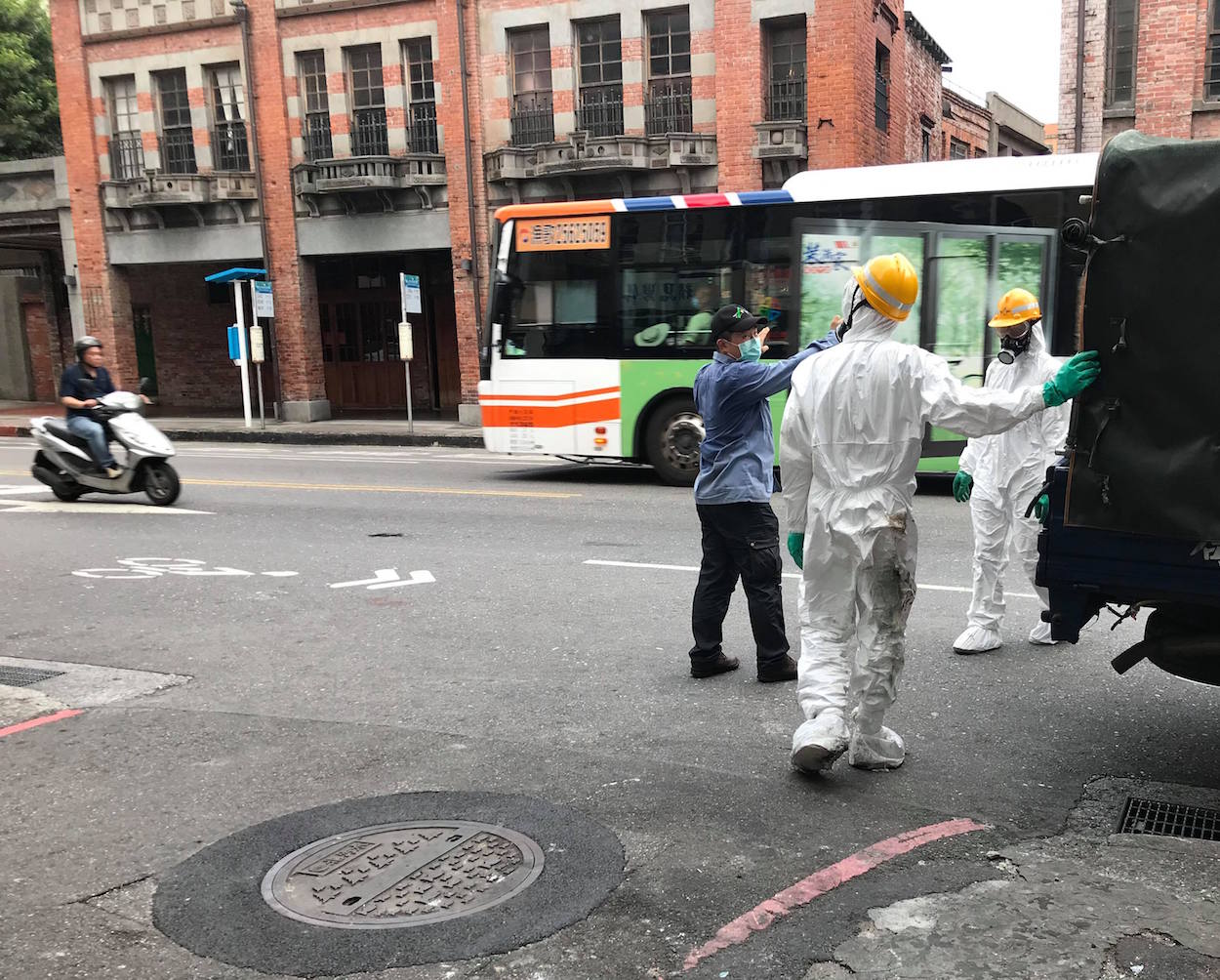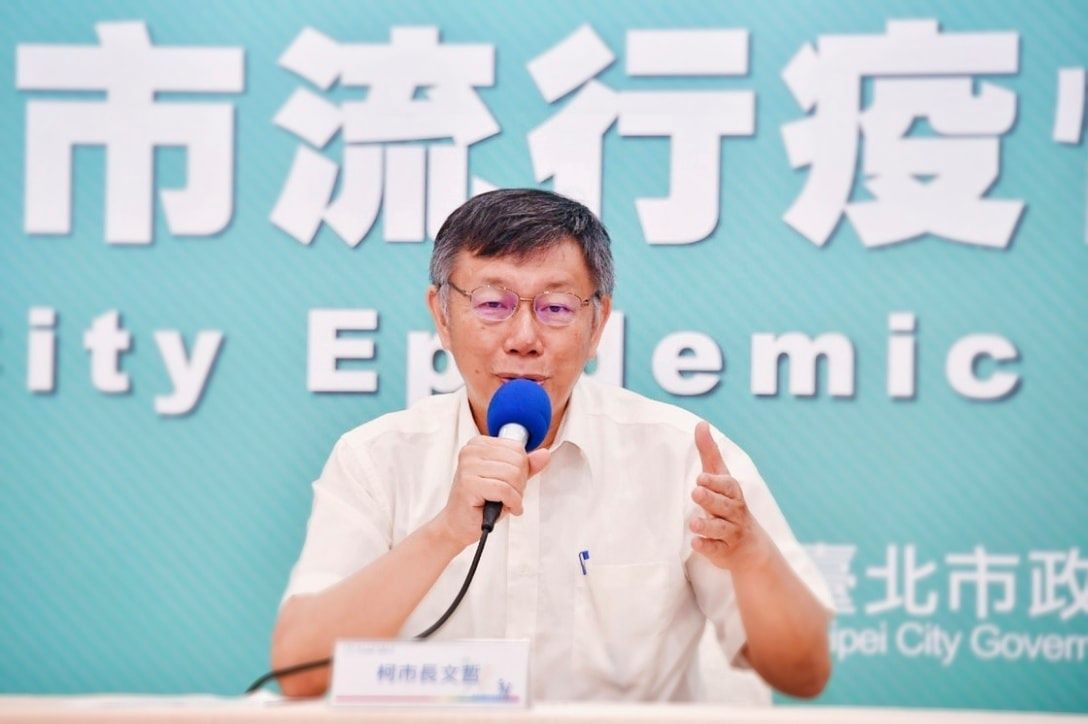by Brian Hioe
語言:
English
Photo Credit: Brian Hioe
THE CENTRAL EPIDEMIC Command Center, which coordinates Taiwan’s response to COVID-19, announced 13 new cases due to domestic transmission today and 12 imported cases.
Three new cases were linked to a tea house in Wanhua, adding to two yesterday, with much concern about the possibility of cases spreading in a densely populated area with a large elderly population, and sex work that takes place in KTVs, massage parlors, and tea houses. Text messages have been sent to all individuals living in the affected area to monitor their health symptoms, and testing sites set up for individuals in the area. Chen urged the media not to photograph individuals at testing centers in Wanhua, because this will stigmatize them, making it less likely for them to be willing to undergo testing—particularly for individuals that may be sex workers.
 Disinfection work undergoing in Wanhua. Photo credit: Brian Hioe
Disinfection work undergoing in Wanhua. Photo credit: Brian Hioe
As the cases were linked to tea houses in Wanhua where sex work primarily with older customers takes place, often known as “a-gong-diam”, this led Taipei mayor Ko Wen-je to order all 172 a-gong-diam in Wanhua to close for three days, with the CECC stressing coordination with local authorities. Disinfection work in Wanhua is ongoing and is partially complete. The cases linked to Wanhua tea houses has, unsurprisingly, led to much sensationalist coverage of sex work in Wanhua in the Taiwanese media. There has also been concern about the fact there are three night markets in the affected area, and that the affected workers worked at different establishments.
Likewise, a number of contacts have been linked to a former head of the New Taipei chapter of Lion’s Club, with particular concern due to his large travel history. The former head of the New Taipei chapter of the Lion’s Club had well over a hundred contacts, and resulted in nine cases of infection.
Although there is continued anxiety regarding the possibility of Taiwan’s COVID-19 alert system being raised to level three, which would be just short of a lockdown, the Central Epidemic Command Center struck a more moderate tone today.
Namely, testing has shown genetic links between the strains of COVID-19 found in the Novotel Taoyuan International hotel, the site of a COVID-19 cluster, and infected individuals in Yilan and Luzhou in New Taipei. There may be links between the Wanhua cluster and the Yilan cluster, which is currently being investigated. The former head of the Lion’s Head chapter had travel history to establishments in Wanhua and Yilan which, too, may be linked, as with a case in Keelung who also had travel history to Wanhua, due to running a stall in Wanhua.
Taiwan saw its largest one-day jump of COVID-19 cases from domestic transmission yesterday, with 16 new cases of COVID-19 that were the result of cases of domestic transmission. This was preceded by six new cases of COVID-19 from domestic transmission on Tuesday, due to new cases linked to a baccarat hall in Yilan.
While Taiwan is currently dealing with two clusters of COVID-19 among China Airlines pilots and at the Novotel Taoyuan International, a quarantine hotel at Taoyuan International Airport used by pilots, the Yilan cluster initially did not appear to have links to these clusters. This could mean that there were cases of domestic transmission chains that were unknown to the CECC, meaning that undetected community transmission was taking place in Taiwan. As such, this resulted in Taiwan’s COVID-19 alert being raised to level two and warnings that Taiwan could see its COVID-19 alert system raised to level three.
 Infographic released by the Ministry of Health and Welfare. Photo credit: 衛生福利部/Facebook
Infographic released by the Ministry of Health and Welfare. Photo credit: 衛生福利部/Facebook
Level two restrictions forbid indoor gatherings of more than 100 people and outdoor gatherings of more than 500 people. However, level three restrictions would result in indoor gatherings of more than five people and outdoor gatherings of more than ten people, with all but non-essential service shutting down—though it remains unclear what is clarified as an “essential” service, with the Ministry of Health and Welfare having suggested that there is some flexibility to what is defined as essential. Access to affected neighborhoods would be restricted and general testing would be carried out.
Though many individuals speculated that yesterday might see the CECC raise the alert system to level three, the CECC declined to do so yesterday, citing that only three of the 16 cases were of unclear origin. Minister of Health Chen Shih-chung suggested today that the fact contact tracing is still possible for the new cases lowers the odds of needing to resort to a lockdown.
But as a result of the new cases, cancellations have been announced across Taiwan. This includes Eid al-Fitr celebrations in Taipei, Dragon Boat Festival activities across Taiwan, training of reserve military personnel by the Ministry of National Defense, agricultural trainings organized by the Council of Agriculture, and other events. Similarly, a number of night markets in Yilan have been closed, along with various basketball and baseball games, theater and stage performances, and concerts.
School campuses have been closed to outside visitors, with at least one elementary school in Taoyuan known to have suspended classes for fourteen days and moved to remote teaching due to contact with the former Lion’s Club chapter head. New Taipei also will see a day of 24 hours of disinfection tomorrow. Real-name registration has been implemented for customers at McDonald’s and Carrefours. Convenience stores will now require social distancing within premises and masks to be worn inside.
Minister of Health and Welfare Chen Shih-chung made comments yesterday interpreted as meaning that local city governments will now be able to purchase vaccines on their own. While New Taipei mayor Hou You-yi has indicated that his city government will consider this, Taipei mayor Ko Wen-je has tried to hit back at the central government, accusing them of trying to push responsibility onto local governments. Members of the pan-Blue camp insist that this is Chen abdicating responsibility, while arguing that Chen would have since been replaced for such actions in other countries. Chen has since emphasized that this was misinterpreted the central government will still be involved in acquisition plans for vaccines by local governments since the central government must sign off on vaccine acquisition purchases, though Taipei mayor Ko Wen-je framed this as Chen concealing that local governments could purchase vaccines through private companies.
While Taiwan previously saw low rates of vaccination, leading to worries that its current supply of 199,200 doses of the AstraZeneca vaccine would expire before being used, the rates of vaccination have now picked up. There is now concern that vaccine supplies will be used up too quickly. The Moderna vaccine is set to arrive in Taiwan later this month, along with the more doses of the AstraZeneca vaccine next month.
In the meantime, civic hacker group g0v has developed a website with information about vaccine availability that can be viewed in English, Chinese, Japanese, Bahasa Indonesian, and Tagalog. Similarly, a social distancing app released by the CECC that allows users to detect proximity to confirmed cases has skyrocketed in downloads in the last few days.
 Taipei mayor Ko Wen-je. Photo credit: 柯粉俱樂部/Facebook
Taipei mayor Ko Wen-je. Photo credit: 柯粉俱樂部/Facebook
To this extent, contestation between local governments and the central government is likely to continue. After Chen’s press conference yesterday, announcing that the CECC would not be shifting to level three, Ko seemed to try to upstage the central government by claiming that Taipei would be moving to “near-level three”, with cancellations of city government activities, but remaining unclear about whether this would mean a lockdown. Similarly, Hou You-yi has suggested in comments that New Taipei may move to a lockdown if needed, resulting in some criticisms of Hou for unnecessarily fear-mongering.
Addressing these concerns, Minister of Health and Welfare Chen Shih-chung stated that approaches to fight the pandemic must be bottom-up rather than top-down, seeing as local governments will have greater knowledge of local conditions. The Tsai administration has proposed allocating an additional 210 billion NT to COVID-19 prevention measures, probably with the aim of reassuring a rattled stock market that saw the largest intraday drop since 1969 in anticipation of a possible lockdown.
The heads of city governments—particularly members of the pan-Blue camp—may seek to upstage the central government by trying to appear more proactive than the central government is, regarding pandemic-fighting measures. Pan-blue invective against Chen has grown particularly heated in recent days, including KMT caucus whip Alex Fei calling for Chen’s execution for the uptick in new cases, sentiments that were echoed by Taipei city councilor Lu Kun-fu.
Similarly, the KMT had sought to target the Tsai administration for not seeking general testing in the past, with the Tsai administration demurring due to the number of false positives this would produce—all such individuals with false positives would have to be hospitalized and quarantined, overwhelming Taiwan’s hospital system. Yet this has again taken place, with the KMT calling on the Tsai administration to undertake general testing.

